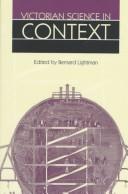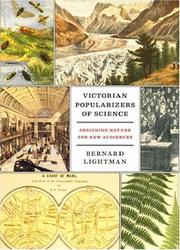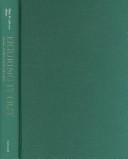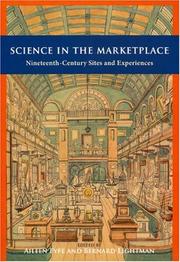| Listing 1 - 10 of 20 | << page >> |
Sort by
|

ISBN: 0226481123 Year: 1997 Publisher: Chicago (Ill.) University of Chicago Press
Abstract | Keywords | Export | Availability | Bookmark
 Loading...
Loading...Choose an application
- Reference Manager
- EndNote
- RefWorks (Direct export to RefWorks)
Science --- History --- Great Britain --- Social conditions

ISBN: 1282426672 9786612426674 0226481174 9780226481173 9780226481180 0226481182 Year: 2007 Publisher: Chicago University of Chicago press
Abstract | Keywords | Export | Availability | Bookmark
 Loading...
Loading...Choose an application
- Reference Manager
- EndNote
- RefWorks (Direct export to RefWorks)
The ideas of Charles Darwin and his fellow Victorian scientists have had an abiding effect on the modern world. But at the time The Origin of Species was published in 1859, the British public looked not to practicing scientists but to a growing group of professional writers and journalists to interpret the larger meaning of scientific theories in terms they could understand and in ways they could appreciate. Victorian Popularizers of Science focuses on this important group of men and women who wrote about science for a general audience in the second half of the nineteenth century. Bernard Lightman examines more than thirty of the most prolific, influential, and interesting popularizers of the day, investigating the dramatic lecturing techniques, vivid illustrations, and accessible literary styles they used to communicate with their audience. By focusing on a forgotten coterie of science writers, their publishers, and their public, Lightman offers new insights into the role of women in scientific inquiry, the market for scientific knowledge, tensions between religion and science, and the complexities of scientific authority in nineteenth-century Britain.
Great Britain - Social conditions - 19th century. --- Great Britain -- Social conditions -- 19th century. --- Science - Great Britain - History - 19th century. --- Science -- Great Britain -- History -- 19th century. --- Technical writing - Great Britain - History - 19th century. --- Technical writing -- Great Britain -- History -- 19th century. --- Science --- Technical writing --- Sciences - General --- Physical Sciences & Mathematics --- History --- Great Britain --- Social conditions --- Engineering --- Scientific writing --- Technology --- Authorship --- Communication of technical information
Book
ISBN: 1855069997 9781855069992 Year: 2004 Publisher: Bristol: Thoemmes,
Abstract | Keywords | Export | Availability | Bookmark
 Loading...
Loading...Choose an application
- Reference Manager
- EndNote
- RefWorks (Direct export to RefWorks)
During the nineteenth century there was no clear boundary line between those who were considered to be part of the scientific community and those who were seen as outsiders. It was during this century that the categories of 'professional scientist', 'amateur' and 'popularizer of science' were being debated and constructed. As a result, in recent times scholars of the period have explored the important roles of neglected amateurs, women and members of the working class. Scholars in the field are continually broadening their definition of the terms 'science' and 'scientist'. This dictionary contains more than 1200 entries on both major and minor figures who had an impact on British science. By examining how the theories and practices of scientists were shaped by Victorian beliefs about religion, gender, imperialism and politics, the dictionary presents a rich panorama of the development of science in the nineteenth century. As well as containing entries on those working in traditional scientific areas, such as geology, physics, astronomy, chemistry, mathematics and biology, the dictionary also covers the human sciences such as anthropology, sociology, psychology and medicine. In addition, areas such as phrenology, mesmerism, spiritualism, scientific illustration, scientific journalism and publishing, instrument making and government policy are covered. By including new figures working in these areas, and by paying attention to the social and cultural context in which they lived, the dictionary reflects the richer picture of the nineteenth-century period gradually being developed by scholars in the field.
Scientists --- Science --- Scientifiques --- Sciences --- Biography --- Dictionaries --- Biographies --- Dictionnaires anglais --- History --- 929 <41> --- 5/6 (09) --- Biografie. Genealogie. Heraldiek--Verenigd Koninkrijk van Groot-Brittannië en Noord-Ierland --- Geschiedenis van de exacte en toegepaste wetenschappen --- 929 <41> Biografie. Genealogie. Heraldiek--Verenigd Koninkrijk van Groot-Brittannië en Noord-Ierland --- Dictionaries. --- Scientists - Great Britain. --- Science - Great Britain - History - 19th century.
Book
ISBN: 1421431408 1421430304 1421431416 Year: 2019 Publisher: Johns Hopkins University Press
Abstract | Keywords | Export | Availability | Bookmark
 Loading...
Loading...Choose an application
- Reference Manager
- EndNote
- RefWorks (Direct export to RefWorks)
Originally published in 1987. The Origins of Agnosticism provides a reinterpretation of agnosticism and its relationship to science. Professor Lightman examines the epistemological basis of agnostics' learned ignorance, studying their core claim that "God is unknowable." To address this question, he reconstructs the theory of knowledge posited by Thomas Henry Huxley and his network of agnostics. In doing so, Lightman argues that agnosticism was constructed on an epistemological foundation laid by Christian thought. In addition to undermining the continuity in the intellectual history of religious thought, Lightman exposes the religious origins of agnosticism.
Agnosticism --- History --- Great Britain --- Intellectual life --- Atheism --- Belief and doubt --- Faith --- Free thought --- Skepticism --- European history
Book
ISBN: 9789004263994 9789004264007 9004264000 9004263993 Year: 2016 Publisher: Leiden ; Boston Brill
Abstract | Keywords | Export | Availability | Bookmark
 Loading...
Loading...Choose an application
- Reference Manager
- EndNote
- RefWorks (Direct export to RefWorks)
Today the name most closely associated with evolutionary theory is Charles Darwin. Given Darwin’s immense reputation it is easy to forget that Herbert Spencer, in his time, was just as famous as Darwin. It turns out that Spencer’s evolutionary thought was not what necessarily appealed to many of his readers, since they had their own sense of his identity and importance. By focusing on Spencer the evolutionist, scholars have tended to concentrate their attention on a rather narrow view of him that has come out of Anglo-American appropriations of his thought. Spencer was one of the first international, public intellectuals whose views on psychology, religion, sociology, ethics, education, and biology captured the imagination of readers all over the world. The chapters will cover the communication and appropriation of Spencer’s ideas in Russia, the Middle East, China, Japan, Mexico, Argentina, Brazil, the United States, Italy, Scandinavia, and France. Contributors are: Li Bin, Juan Manuel Rodriguez Caso, Gowan Dawson, Heloisa Maria Bertol Domingues, Marwa Elshakry, Mark Francis, G. Clinton Godart, Michael Gordon, Paola Govoni, Rosaura Ruiz Gutiérrez, Hans Henrik Hjermitslev, Ricardo Noguera-Solano, Adriana Novoa, Greg Radick, Nathalie Richard, Ke Zunke.
Evolution. --- Philosophy --- Creation --- Emergence (Philosophy) --- Teleology --- Spencer, Herbert,
Book
ISBN: 9780822945741 9780822987048 082298704X Year: 2019 Publisher: Pittsburgh
Abstract | Keywords | Export | Availability | Bookmark
 Loading...
Loading...Choose an application
- Reference Manager
- EndNote
- RefWorks (Direct export to RefWorks)
The historical interface between science and religion was depicted as an unbridgeable conflict in the last quarter of the nineteenth century. Starting in the 1970s, such a conception was too simplistic and not at all accurate when considering the totality of that relationship. This volume evaluates the utility of the "complexity principle" in past, present, and future scholarship. First put forward by historian John Brooke over twenty-five years ago, the complexity principle rejects the idea of a single thesis of conflict or harmony, or integration or separation, between science and religion. Rethinking History, Science, and Religion brings together an interdisciplinary group of scholars at the forefront of their fields to consider whether new approaches to the study of science and culture-such as recent developments in research on science and the history of publishing, the global history of science, the geographical examination of space and place, and science and media-have cast doubt on the complexity thesis, or if it remains a serviceable historiographical model. --
Religion and science --- History --- History.
Book
ISBN: 9781118620762 9781118620779 9781119121145 9781118620748 9781118620755 Year: 2020 Publisher: Chichester : Wiley-Blackwell,
Abstract | Keywords | Export | Availability | Bookmark
 Loading...
Loading...Choose an application
- Reference Manager
- EndNote
- RefWorks (Direct export to RefWorks)
"Over the last thirty-five years, the study of the history of science has undergone a shift in historiographical approach. While scholars previously focused on the history of abstract scientific discoveries by key figures like Galileo and Newton, contemporary science historians are turning to focus on richer, more descriptive studies within specific and local contexts. A Companion to the History of Science captures this move away from abstract theories and into more intimate analysis of science in its cultural, political, and social contexts. It aims to survey recent developments that have resulted from the effort to re-envision the field. The volume includes forty original essays written by experts in the field, structured around four analytical categories: the roles, places and spaces, communication, and tools of science. Contributors cut across traditional chronological and geographical boundaries to provide thematic analysis of these topics, including discussion of both Western and non-Western themes throughout the volume. These critical essays synthesize the major debates and issues that dominate current scholarly discussion, and point the way for future inquiry"--
Science --- Historiography --- Historiography.

ISBN: 1584656026 1584656034 9781584656029 9781584656036 Year: 2006 Publisher: Hanover, N.H. Dartmouth College Press
Abstract | Keywords | Export | Availability | Bookmark
 Loading...
Loading...Choose an application
- Reference Manager
- EndNote
- RefWorks (Direct export to RefWorks)

ISBN: 022615002X 9780226150024 9780226276502 0226276503 Year: 2007 Publisher: Chicago
Abstract | Keywords | Export | Availability | Bookmark
 Loading...
Loading...Choose an application
- Reference Manager
- EndNote
- RefWorks (Direct export to RefWorks)
The nineteenth century was an age of transformation in science, when scientists were rewarded for their startling new discoveries with increased social status and authority. But it was also a time when ordinary people from across the social spectrum were given the opportunity to participate in science, for education, entertainment, or both. In Victorian Britain science could be encountered in myriad forms and in countless locations: in panoramic shows, exhibitions, and galleries; in city museums and country houses; in popular lectures; and even in domestic conversations that revolved around t
Science --- Science museums --- Science centers --- Museums --- Natural science --- Natural sciences --- Science of science --- Sciences --- Social aspects --- History --- Great Britain --- Intellectual life --- 19th century, history, historical, humanities, science, transformation, change, scientists, marketplace, social status, authority, discovery, education, entertainment, victorian period, britain, british, panoramic shows, exhibitions, galleries, museums, lectures, cultural studies, culture, popular sciences, common points of discussion, phrenology, popularity, natural, nature, electricity, anatomy, demonstrations.
Book
ISBN: 1139989987 1316010600 113998537X 1316012840 1139236199 1316006107 1316001601 1316008347 1316003841 1107028426 1316646785 Year: 2014 Publisher: Cambridge : Cambridge University Press,
Abstract | Keywords | Export | Availability | Bookmark
 Loading...
Loading...Choose an application
- Reference Manager
- EndNote
- RefWorks (Direct export to RefWorks)
In this collection of essays from leading scholars, the dynamic interplay between evolution and Victorian culture is explored for the first time, mapping new relationships between the arts and sciences. Rather than focusing simply on evolution and literature or art, this volume brings together essays exploring the impact of evolutionary ideas on a wide range of cultural activities including painting, sculpture, dance, music, fiction, poetry, cinema, architecture, theatre, photography, museums, exhibitions and popular culture. Broad-ranging, rather than narrowly specialized, each chapter provides a brief introduction to key scholarship, a central section exploring original insights drawn from primary source material, and a conclusion offering overarching principles and a projection towards further areas of research. Each chapter covers the work of significant individuals and groups applying evolutionary theory to their particular art, both as theorists and practitioners. This comprehensive examination of topics sheds light on larger and previously unknown Victorian cultural patterns.
Culture --- English literature --- Social evolution --- Cultural evolution --- Cultural transformation --- Culture, Evolution of --- Evolution --- Social change --- Literature, Victorian --- Victorian literature --- Cultural sociology --- Sociology of culture --- Civilization --- Popular culture --- History --- Social aspects --- Arts, Victorian. --- Evolution in literature. --- Victorian arts --- History and criticism. --- Philosophy --- Great Britain
| Listing 1 - 10 of 20 | << page >> |
Sort by
|

 Search
Search Feedback
Feedback About UniCat
About UniCat  Help
Help News
News